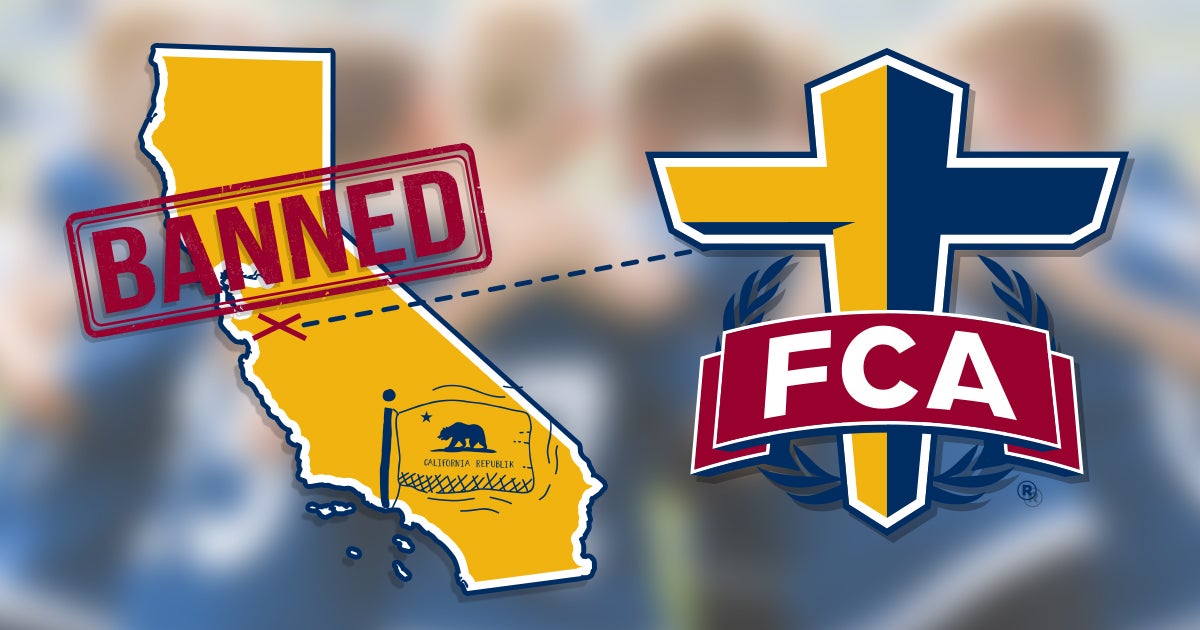
by Jorge Gomez • 6 min read
First Liberty recently filed a brief in federal appeals court supporting the Fellowship of Christian Athletes (FCA), a student-led club on many public high school campuses. It helps students share their faith, grow as athletes, serve their local community, and encourage one another through testimony, prayer and Bible study.
A California school district revoked the official status of the student-led club. Teachers and administrators shunned, shamed and bullied the clubs because of their religious beliefs, effectively forcing them out of existence on multiple campuses. Meanwhile, the district recognized a Satanic Temple student club formed to protest FCA.
For more than a decade, student-led FCA clubs met at San Jose’s Pioneer High School. In 2019, however, a teacher singled out FCA’s religious beliefs for ridicule, goaded students into protesting and harassing the club. The teacher even suggested that FCA’s beliefs and mere presence on campus should be treated as equivalent to sexual harassment. Ultimately, this led the district to kick the club off campus. Eventually, all FCA clubs in the San Jose Unified School District had their status revoked.
In 2020, FCA—represented by our friends at the Center for Law and Religious Freedom and the Becket Fund—sued in federal court challenging the school district’s decision. Their lawsuit argued that the school district violated the 1984 Equal Access Act, a federal law protecting student meetings and prohibiting schools from barring such meetings on the basis of religious, political, philosophical, or other speech content. The suit also explains how the school district violated students’ constitutional free speech and religious liberty rights.
A federal district court recently ruled against FCA, denying its request to restore it as an approved club. The judge also held that the school district’s nondiscrimination policy—one that would have required FCA to open club leadership to students who did not share its beliefs—was “content-neutral because it does not preclude religious speech but rather prohibits acts of discrimination.” FCA’s attorneys appealed the decision, and the case is now pending at the Ninth Circuit Court of Appeals.
First Liberty submitted our brief on behalf of current and former students who faced religious discrimination from their public schools because they led religious student clubs. Our attorneys explain:
“Despite the District’s halfhearted efforts to justify its actions, the Establishment Clause provides no excuse for marginalizing students’ religious activity at school…The First Amendment guarantees that American students are treated equally and respectfully, regardless of their religious beliefs.”
We also remind the Ninth Circuit of the recent U.S. Supreme Court ruling in Kennedy v. Bremerton School District. In this landmark victory for our client Coach Joe Kennedy, the Court clarified that the Constitution does not “require the government to single out private religious speech for special disfavor,” nor does it justify censoring “private religious speech.”
It’s clear the school district’s actions are blatant discrimination. Consider the fact that FCA encourages and welcomes all students to attend meetings. The club asks only that those who seek to lead FCA’s ministry affirm the club’s religious beliefs. Nevertheless, the district chose to target and label the club “discriminatory.”
One thing is clear: the school district did not apply the rules evenhandedly to all groups and singled out FCA because of its religious beliefs. This isn’t just outrageous. It’s unconstitutional. Our brief makes this clear:
“The Free Exercise and Free Speech Clauses of the First Amendment prohibit public school districts from being hostile to religious expression or from targeting religion for unequal treatment, and the Establishment Clause provides no excuse for such actions…These First Amendment protections extend to teenage students expressing their sincere religious beliefs through voluntary clubs.”
Recent U.S. Supreme Court rulings—including Espinoza v. Montana (2020), Fulton v. Philadelphia (2021), Carson v. Makin (2022), Kennedy v. Bremerton School District (2022) and Boston v. Shurtleff (2022)—have held that the government cannot treat religious organizations and individuals more harshly. It must regard them the same as their secular counterparts.
With so many Supreme Court decisions affirming the religious liberty of students, it’s shocking that a group like FCA is still being forced to go to court and fight for a place on their campus community.
Religious students should not be punished, harassed or excluded because of their beliefs. America’s schools should be places that foster an environment inclusive of diverse viewpoints. If school districts in California can target and intimidate religious clubs nearly out of existence with impunity, how long will it take for school districts elsewhere to do the same? For the sake of millions of students across the country, let’s pray that the Ninth Circuit rules in favor of religious freedom and delivers the justice that FCA deserves.